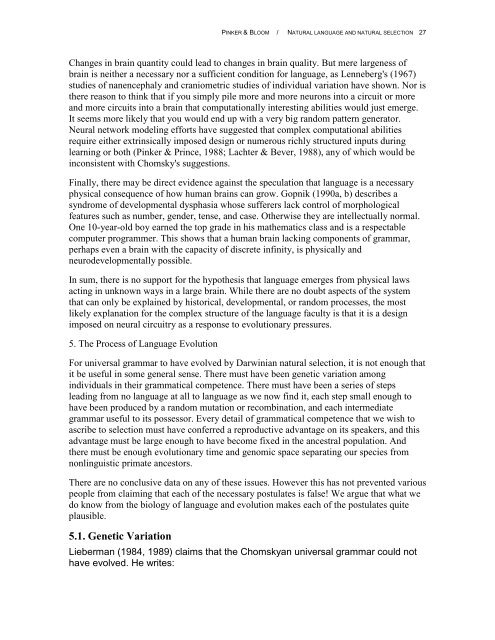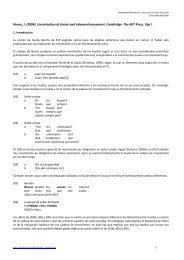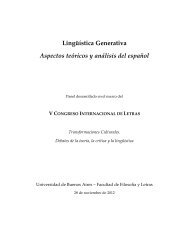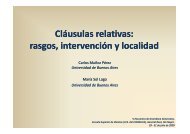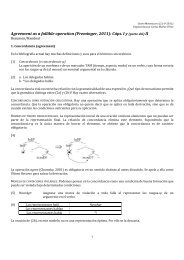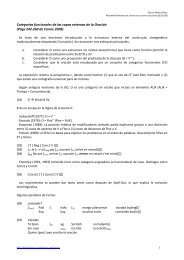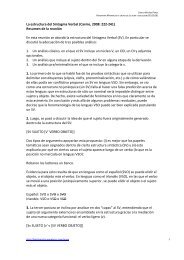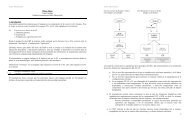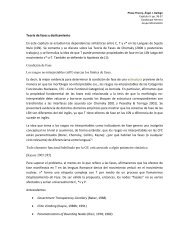Pinker - Bloom - NATURAL LANGUAGE AND NATURAL SELECTION
Pinker - Bloom - NATURAL LANGUAGE AND NATURAL SELECTION
Pinker - Bloom - NATURAL LANGUAGE AND NATURAL SELECTION
Create successful ePaper yourself
Turn your PDF publications into a flip-book with our unique Google optimized e-Paper software.
PINKER & BLOOM / <strong>NATURAL</strong> <strong>LANGUAGE</strong> <strong>AND</strong> <strong>NATURAL</strong> <strong>SELECTION</strong> 27<br />
Changes in brain quantity could lead to changes in brain quality. But mere largeness of<br />
brain is neither a necessary nor a sufficient condition for language, as Lenneberg's (1967)<br />
studies of nanencephaly and craniometric studies of individual variation have shown. Nor is<br />
there reason to think that if you simply pile more and more neurons into a circuit or more<br />
and more circuits into a brain that computationally interesting abilities would just emerge.<br />
It seems more likely that you would end up with a very big random pattern generator.<br />
Neural network modeling efforts have suggested that complex computational abilities<br />
require either extrinsically imposed design or numerous richly structured inputs during<br />
learning or both (<strong>Pinker</strong> & Prince, 1988; Lachter & Bever, 1988), any of which would be<br />
inconsistent with Chomsky's suggestions.<br />
Finally, there may be direct evidence against the speculation that language is a necessary<br />
physical consequence of how human brains can grow. Gopnik (1990a, b) describes a<br />
syndrome of developmental dysphasia whose sufferers lack control of morphological<br />
features such as number, gender, tense, and case. Otherwise they are intellectually normal.<br />
One 10-year-old boy earned the top grade in his mathematics class and is a respectable<br />
computer programmer. This shows that a human brain lacking components of grammar,<br />
perhaps even a brain with the capacity of discrete infinity, is physically and<br />
neurodevelopmentally possible.<br />
In sum, there is no support for the hypothesis that language emerges from physical laws<br />
acting in unknown ways in a large brain. While there are no doubt aspects of the system<br />
that can only be explained by historical, developmental, or random processes, the most<br />
likely explanation for the complex structure of the language faculty is that it is a design<br />
imposed on neural circuitry as a response to evolutionary pressures.<br />
5. The Process of Language Evolution<br />
For universal grammar to have evolved by Darwinian natural selection, it is not enough that<br />
it be useful in some general sense. There must have been genetic variation among<br />
individuals in their grammatical competence. There must have been a series of steps<br />
leading from no language at all to language as we now find it, each step small enough to<br />
have been produced by a random mutation or recombination, and each intermediate<br />
grammar useful to its possessor. Every detail of grammatical competence that we wish to<br />
ascribe to selection must have conferred a reproductive advantage on its speakers, and this<br />
advantage must be large enough to have become fixed in the ancestral population. And<br />
there must be enough evolutionary time and genomic space separating our species from<br />
nonlinguistic primate ancestors.<br />
There are no conclusive data on any of these issues. However this has not prevented various<br />
people from claiming that each of the necessary postulates is false! We argue that what we<br />
do know from the biology of language and evolution makes each of the postulates quite<br />
plausible.<br />
5.1. Genetic Variation<br />
Lieberman (1984, 1989) claims that the Chomskyan universal grammar could not<br />
have evolved. He writes:


